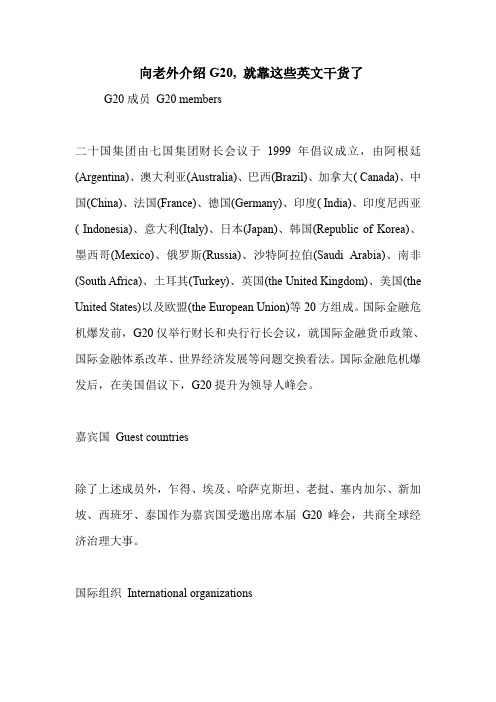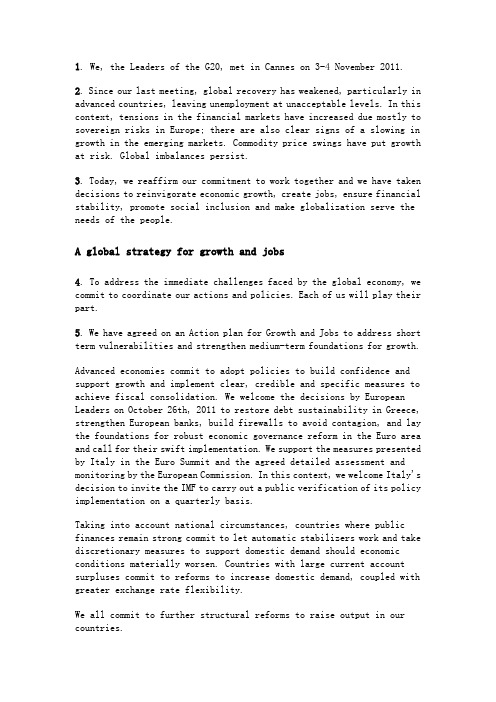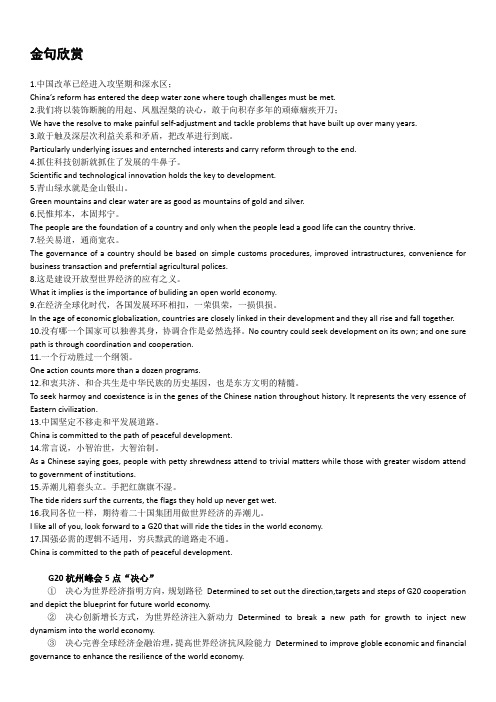英文G20峰会手抄报
- 格式:docx
- 大小:37.52 KB
- 文档页数:3

向老外介绍G20, 就靠这些英文干货了G20成员G20 members二十国集团由七国集团财长会议于1999年倡议成立,由阿根廷(Argentina)、澳大利亚(Australia)、巴西(Brazil)、加拿大( Canada)、中国(China)、法国(France)、德国(Germany)、印度( India)、印度尼西亚( Indonesia)、意大利(Italy)、日本(Japan)、韩国(Republic of Korea)、墨西哥(Mexico)、俄罗斯(Russia)、沙特阿拉伯(Saudi Arabia)、南非(South Africa)、土耳其(Turkey)、英国(the United Kingdom)、美国(the United States)以及欧盟(the European Union)等20方组成。
国际金融危机爆发前,G20仅举行财长和央行行长会议,就国际金融货币政策、国际金融体系改革、世界经济发展等问题交换看法。
国际金融危机爆发后,在美国倡议下,G20提升为领导人峰会。
嘉宾国Guest countries除了上述成员外,乍得、埃及、哈萨克斯坦、老挝、塞内加尔、新加坡、西班牙、泰国作为嘉宾国受邀出席本届G20峰会,共商全球经济治理大事。
国际组织International organizations按惯例,G20还会邀请7个国际组织的领导人或代表与会联合国(United Nations)、世界银行(World Bank)、国际货币基金组织(International Monetary Fund)、世界贸易组织(World Trade Organization)、国际劳工组织(International Labour Organization)、经济合作与发展组织(Organisation for Economic Co-operation and Development)和金融稳定理事会(Financial Stability Board)。

g20峰会英语简介不知道大家对g20峰会的了解有多少呢?下面由店铺为你提供的g20峰会英语简介,希望大家喜欢。
g20峰会英语简介(一)The Group of Twenty (G20) Summit on Financial Markets and the World Economy was held Saturday local time in Washington, the first of its kind for the Group of 20 since it was founded in 1999. Heads of state of the Group of 20, as well as UN Secretary General Ban Ki-moon, and leaders of the international organizations such as the World Bank and International Monetary Fund attended the meeting. Being held amid serious challenges to the world economy and financial markets, the summit issued a declaration, in which leaders say they are determined to enhance cooperation and work together to restore global growth and achieve needed reforms in the world's financial system. As widely expected before the summit, the leaders vow to implement reforms in order to strengthen financial markets and regulatory regimes so as to avoid future crisis.g20峰会英语简介(二)The G20 (or G-20 or Group of Twenty) is an international forum for the governments and central bank governors from 20 major economies. It was founded in 1999 with the aim of studying, reviewing, and promoting high-level discussion of policy issues pertaining to the promotion of international financial stability. It seeks to address issues that go beyond the responsibilities of any one organization.The G20 heads of government or heads of state have periodically conferred at summits since their initial meeting in 2008, and the group alsohosts separate meetings of finance ministers and central bank governors.With the G20 growing in stature after its inaugural leaders' summit in 2008, its leaders announced on 25 September 2009 that the group would replace the G8 as the main economic council of wealthy nations. Since its inception, the G20's membership policies have been criticized by numerous intellectuals, and its summits have been a focus for major protests by anti-globalists, nationalists and others.The heads of the G20 nations met semi-annually at G20 summits between 2009 and 2010. Since the November 2011 Cannes summit, all G20 summits have been held annually.g20峰会英语简介(三)二十国集团 (Group20) 是1999年9月25日由八国集团的财长在华盛顿提出的,目的是防止类似亚洲金融风暴的重演,让有关国家就国际经济、货币政策举行非正式对话,以利于国际金融和货币体系的稳定。

1. We, the Leaders of the G20, met in Cannes on 3-4 November 2011.2. Since our last meeting, global recovery has weakened, particularly in advanced countries, leaving unemployment at unacceptable levels. In this context, tensions in the financial markets have increased due mostly to sovereign risks in Europe; there are also clear signs of a slowing in growth in the emerging markets. Commodity price swings have put growth at risk. Global imbalances persist.3. Today, we reaffirm our commitment to work together and we have taken decisions to reinvigorate economic growth, create jobs, ensure financial stability, promote social inclusion and make globalization serve the needs of the people.A global strategy for growth and jobs4. To address the immediate challenges faced by the global economy, we commit to coordinate our actions and policies. Each of us will play their part.5. We have agreed on an Action plan for Growth and Jobs to address short term vulnerabilities and strengthen medium-term foundations for growth.Advanced economies commit to adopt policies to build confidence and support growth and implement clear, credible and specific measures to achieve fiscal consolidation. We welcome the decisions by European Leaders on October 26th, 2011 to restore debt sustainability in Greece, strengthen European banks, build firewalls to avoid contagion, and lay the foundations for robust economic governance reform in the Euro area and call for their swift implementation. We support the measures presented by Italy in the Euro Summit and the agreed detailed assessment and monitoring by the European Commission. In this context, we welcome Italy's decision to invite the IMF to carry out a public verification of its policy implementation on a quarterly basis.Taking into account national circumstances, countries where public finances remain strong commit to let automatic stabilizers work and take discretionary measures to support domestic demand should economic conditions materially worsen. Countries with large current account surpluses commit to reforms to increase domestic demand, coupled with greater exchange rate flexibility.We all commit to further structural reforms to raise output in our countries.Monetary policies will maintain price stability over the medium term and continue to support economic recovery.6. We are determined to strengthen the social dimension of globalization. We firmly believe that employment and social inclusion must be at the heart of our actions and policies to restore growth and confidence. We therefore decide to set up a G20 task force which will work as a priority on youth employment. We recognize the importance of social protection floors in each of our countries, adapted to national situations. We encourage the ILO to continue promoting ratification and implementation of the eight core Conventions ensuring fundamental principles and rights at work.7. Convinced of the essential role of social dialogue, we welcome the outcomes of the B20 and L20 and their joint statement.Towards a more stable and resilient International Monetary System8. We have made progress in reforming the international monetary system to make it more representative, stable and resilient. We have agreed on actions and principles that will help reap the benefits from financial integration and increase the resilience against volatile capital flows. This includes coherent conclusions to guide us in the management of capital flows, common principles for cooperation between the IMF and Regional Financial Arrangements, and an action plan for local currency bond markets. We agree that the SDR basket composition should continue to reflect the role of currencies in the global trading and financial system. The SDR composition assessment should be based on existing criteria, and we ask the IMF to further clarify them. To adjust to currencies' changing role and characteristics over time, the composition of the SDR basket will be reviewed in 2015, or earlier, as currencies meet the existing criteria to enter the basket. We are also committed to further progress towards a more integrated, even-handed and effective IMF surveillance and to better identify and address spill-over effects. While continuing with our efforts to strengthen surveillance, we recognize the need for better integration of bilateral and multilateral surveillance, and we look forward to IMF proposals for a new integrated decision on surveillance early next year, and for increased ownership and traction.9. We affirm our commitment to move more rapidly toward moremarket-determined exchange rate systems and enhance exchange rate flexibility to reflect underlying economic fundamentals, avoid persistent exchange rate misalignments and refrain from competitive devaluation of currencies. We are determined to act on our commitments to exchange rate reform articulated in our Action plan for Growth and Jobsto address short term vulnerabilities and restoring financial stability and strengthen the medium-term foundations for growth. Our actions will help address the challenges created by developments in global liquidity and capital flows volatility, thus facilitating further progress on exchange rate reforms and reducing excessive accumulation of reserves.10. We agreed to continue our efforts to further strengthen global financial safety nets and we support the IMF in putting forward the new Precautionary and Liquidity Line (PLL) to provide on a case by case basis increased and more flexible short-term liquidity to countries with strong policies and fundamentals facing exogenous shocks. We also support the IMF in putting forward a single facility to fulfil the emergency assistance needs of its members. We call on the IMF to expeditiously discuss and finalize both proposals.11. We welcome the euro area's comprehensive plan and urge rapid elaboration and implementation, including of country reforms. We welcome the euro area's determination to bring its full resources and entire institutional capacity to bear in restoring confidence and financial stability, and in ensuring the proper functioning of money and financial markets.We will ensure the IMF continues to have resources to play its systemic role to the benefit of its whole membership, building on the substantial resources we have already mobilized since London in 2009. We stand ready to ensure additional resources could be mobilised in a timely manner and ask our finance ministers by their next meeting to work on deploying a range of various options including bilateral contributions to the IMF, SDRs, and voluntary contributions to an IMF special structure such as an administered account. We will expeditiously implement in full the 2010 quota and governance reform of the IMF.Reforming the financial sector and enhancing market integrity12. In Washington in 2008, we committed to ensure that all financial markets, products and participants are regulated or subject to oversight, as appropriate. We will implement our commitments and pursue the reform of the financial system.13. We have agreed on comprehensive measures so that no financial firm can be deemed "too big to fail" and to protect taxpayers from bearing the costs of resolution. The FSB publishes today an initial list of Global systemically important financial institutions (G-SIFIs). G-SIFIs will be submitted to strengthened supervision, a new international standard forresolution regimes as well as, from 2016, additional capital requirements. We are prepared to identify systemically important non-bank financial entities.14. We have decided to develop the regulation and oversight of shadow banking. We will develop further our regulation on market integrity and efficiency, including addressing the risks posed by high frequency trading and dark liquidity. We have tasked IOSCO to assess the functioning of Credit Default Swaps markets. We have agreed on principles to protect financial services consumers.15. We will not allow a return to pre-crisis behaviours in the financial sector and we will strictly monitor the implementation of our commitments regarding banks, OTC markets and compensation practices.16. Building on its achievements, we have agreed to reform the FSB to improve its capacity to coordinate and monitor our financial regulation agenda. This reform includes giving it legal personality and greater financial autonomy. We thank Mr Mario Draghi for the work done and we welcome the appointment of Mr Mark Carney, Governor of the Central Bank of Canada as Chairman of the FSB, and of Mr. Philipp Hildebrand, Chairman of the Swiss National Bank as Vice-Chairman.17. We urge all jurisdictions to adhere to the international standards in the tax, prudential and AML/CFT areas. We stand ready to use our existing countermeasures if needed. In the tax area, we welcome the progress made and we urge all the jurisdictions to take the necessary actions to tackle the deficiencies identified in the course of the reviews by the Global Forum, in particular the 11 jurisdictions identified by the Global Forum whose framework has failed to qualify. We underline the importance of comprehensive tax information exchange and encourage work in the Global Forum to define the means to improve it. We welcome the commitment made by all of us to sign the Multilateral Convention on Mutual Administrative Assistance in Tax Matters and strongly encourage other jurisdictions to join this Convention.Addressing commodity price volatility and promoting agriculture18. As part of our financial regulation agenda, we endorse the IOSCO recommendations to improve regulation and supervision of commodity derivatives markets. We agree that market regulators should be granted effective intervention powers to prevent market abuses. In particular, market regulators should have and use formal position management powers,among other powers of intervention, including the power to set ex-ante position limits, as appropriate.19. Promoting agricultural production is key to feed the world population. To that end, we decide to act in the framework of the Action Plan on Food Price Volatility and Agriculture agreed by our Ministers of Agriculture in June 2011. In particular, we decide to invest in and support research and development of agriculture productivity. We have launched the "Agricultural Market Information System" (AMIS) to reinforce transparency on agricultural products' markets. To improve food security, we commit to develop appropriate risk-management instruments and humanitarian emergency tools. We decide that food purchased fornon-commercial humanitarian purposes by the World Food Program will not be subject to export restrictions or extraordinary taxes. We welcome the creation of a "Rapid Response Forum", to improve the international community's capacity to coordinate policies and develop common responses in time of market crises.Improving energy markets and pursuing the Fight against Climate Change20. We are determined to enhance the functioning and transparency of energy markets. We commit to improve the timeliness, completeness and reliability of the JODI-oil database and to work on the JODI-gas database along the same principles. We call for continued dialogue annually between producers and consumers on short medium and long-term outlook and forecasts for oil, gas and coal. We ask relevant organizations to make recommendations on the functioning and oversight of price reporting agencies. We reaffirm our commitment to rationalise and phase-out over the medium term inefficient fossil fuel subsidies that encourage wasteful consumption, while providing targeted support for the poorest.21. We are committed to the success of the upcoming Durban Conference on Climate Change and support South Africa as the incoming President of the Conference. We call for the implementation of the Cancun agreements and further progress in all areas of negotiation, including the operationalization of the Green Climate Fund, as part of a balanced outcome in Durban. We discussed the IFIs report on climate finance and asked our Finance Ministers to continue work in this field, taking into account the objectives, provisions and principles of the UNFCCC.Avoiding protectionism and strengthening the multilateraltrading system22. At this critical time for the global economy, it is important to underscore the merits of the multilateral trading system as a way to avoid protectionism and not turn inward. We reaffirm our standstill commitments until the end of 2013, as agreed in Toronto, commit to roll back any new protectionist measure that may have risen, including new export restrictions and WTO-inconsistent measures to stimulate exports and ask the WTO, OECD and UNCTAD to continue monitoring the situation and to report publicly on a semi-annual basis.23. We stand by the Doha Development Agenda (DDA) mandate. However, it is clear that we will not complete the DDA if we continue to conduct negotiations as we have in the past. We recognize the progress achieved so far. To contribute to confidence, we need to pursue in 2012 fresh, credible approaches to furthering negotiations, including the issues of concern for Least Developed Countries and, where they can bear fruit, the remaining elements of the DDA mandate. We direct our Ministers to work on such approaches at the upcoming Ministerial meeting in Geneva and also to engage into discussions on challenges and opportunities to the multilateral trading system in a globalised economy and to report back by the Mexico Summit.24. Furthermore, as a contribution to a more effective, rules-based trading system, we support a strengthening of the WTO, which should play a more active role in improving transparency on trade relations and policies and enhancing the functioning of the dispute settlement mechanism.Addressing the challenges of development25. Recognizing that economic shocks affect disproportionately the most vulnerable, we commit to ensure a more inclusive and resilient growth.26. The humanitarian crisis in the Horn of Africa underscores the urgent need to strengthen emergency and long-term responses to food insecurity. We support the concrete initiatives mentioned in the Cannes final Declaration, with a view to foster investments in agriculture and mitigate the impact of price volatility, in particular in low income countries and to the benefit of smallholders. We welcome the initiative of the Economic Community of Western African States (ECOWAS) to set up a targeted regionalemergency humanitarian food reserve system, as a pilot project, and the "ASEAN+3" emergency rice reserve initiative.27. Recognizing that the lack of Infrastructure dramatically hampers the growth potential in many developing countries, particularly in Africa, we support recommendations of the High Level Panel and the MDBs and highlight eleven exemplary infrastructure projects and call on the MDBs, working with countries involved, to pursue the implementation of such projects that meet the HLP criteria.28. In order to meet the Millennium Development Goals, we stress the pivotal role of ODA. Aid commitments made by developed countries should be met. Emerging countries will engage or continue to extend their level of support to other developing countries. We also agree that, over time, new sources of funding need to be found to address development needs and climate change. We discussed a set of options for innovative financing highlighted by Mr Bill Gates. Some of us have implemented or are prepared to explore some of these options. We acknowledge the initiatives in some of our countries to tax the financial sector for various purposes, including a financial transaction tax, inter alia to support development.Intensifying our Fight against Corruption29. We have made significant progress in implementing the Action Plan on combating corruption, promoting market integrity and supporting a clean business environment. We underline the need for swift implementation of a strong international legislative framework, the adoption of national measures to prevent and combat corruption and foreign bribery, the strengthening of international cooperation in fighting corruption and the development of joint initiatives between the public and the private sector.Reforming global governance for the 21st century30. We welcome the report of UK Prime Minister David Cameron on global governance. We agree that the G20 should remain an informal group. We decide to formalise the Troika. We will pursue consistent and effective engagement with non-members, including the UN and we welcome their contributions to our work.31. We reaffirm that the G20's founding spirit of bringing together the major economies on an equal footing to catalyze action is fundamental and therefore agree to put our collective political will behind our economicand financial agenda, and the reform and more effective working of relevant international institutions. We support reforms to be implemented within the FAO and the FSB We have committed to strengthen our multilateral trade framework. We call on international organisations, especially the UN, WTO, the ILO, the WB, the IMF and the OECD, to enhance their dialogue and cooperation, including on the social impact of economic policies, and to intensify their coordination.On December 1st. 2011, Mexico will start chairing the G20. We will convene in Los Cabos, Baja California, in June 2012, under the Chairmanship of Mexico. Russia will chair the G20 in 2013, Australia in 2014 and Turkey in 2015. We have also agreed, as part of our reforms to the G20, that after 2015, annual presidencies of the G20 will be chosen from rotating regional groups, starting with the Asian grouping comprising of China, Indonesia, Japan and Korea.32. We thank France for its G20 Presidency and for hosting the successful Cannes Summit.。

金句欣赏1.中国改革已经进入攻坚期和深水区;China’s reform has entered the deep water zone where tough challenges must be met.2.我们将以装饰断腕的用起、凤凰涅槃的决心,敢于向积存多年的顽瘴痼疾开刀;We have the resolve to make painful self-adjustment and tackle problems that have built up over many years.3.敢于触及深层次利益关系和矛盾,把改革进行到底。
Particularly underlying issues and enternched interests and carry reform through to the end.4.抓住科技创新就抓住了发展的牛鼻子。
Scientific and technological innovation holds the key to development.5.青山绿水就是金山银山。
Green mountains and clear water are as good as mountains of gold and silver.6.民惟邦本,本固邦宁。
The people are the foundation of a country and only when the people lead a good life can the country thrive.7.轻关易道,通商宽农。
The governance of a country should be based on simple customs procedures, improved intrastructures, convenience for business transaction and preferntial agricultural polices.8.这是建设开放型世界经济的应有之义。


2020年时政小报模板
G20峰会将在沙特举行
第15届G20领导人峰会将于2020年11月21日至22日在沙特阿拉伯利雅得举行,这是G20峰会首次在阿拉伯国家举办。
峰会议程将涉及金融、经济和社会问题,尤其重视制定有效政策,以实现可持续和平衡的发展并创造就业机会。
“东方红一号”发射成功50周年
1970年4月24日,中国第一颗人造地球卫星“东方红一号”发射成功。
回望过去50年,我们不仅看到了中国航天事业的巨大飞跃,更也看到了中国人“敢上九天揽月”的豪情壮志。
中国航天的“超级2020”,更受期待。
上交所30周年
1990年11月26日新中国成立以来在中国大陆开业的第一家证券交易所——上海证券交易所正式成立。
上交所30年的快速成长,也是中国资本市场深化改革的一个缩影。
回顾30年,中国资本市场从无到有、从小到大,成为全球重要的新兴市场,为中国经济社会发展做出重要贡献。
5G网络将覆盖所有地级市
2019年,中国正式启动5G商用,这让人们对于5G时代的生活充满期待。
全国工业和信息化工作会议提出,稳步推进5G网络建设,深化共建共享,力争2020年底实现全国所有地级市覆盖5G网络。
国际数据公司(IDC)预测,到2020年,5G智能手机出货量将达到1.9亿部,占总出货量14亿部的14%,同比增长1.5%。
无人驾驶、AR演唱会、服务机器人……5G,不只是比4G多1G。
伴随着全国所有地级市覆盖5G网络,更多人将享受到5G带来的高速率、低时延的上网体验,见证一系列产业的变革。
G20峰会宣言全文(中英文)2009-04-12 15:351、在世界经济和金融市场遭遇严重挑战时,我们即二十国集团领导人于2008年11月15日在美国华盛顿举行了一次初步会议。
我们决定增强相互合作,努力恢复全球经济增长,实现全球金融体系的必要改革。
2、在过去几个月,我们各国采取了紧急和特别措施以支撑全球经济和稳定金融市场。
这些努力必须要继续下去。
同时,我们必须推进改革以确保全球性的危机比如这次危机不再发生。
我们的工作将遵循一个共同信念,即市场原则、开放的贸易和投资体制、受到有效监管的金融市场,将培养活力、创新和创业精神,这些是经济增长、就业和减少贫困所不可缺少的基本因素。
目前危机根源3、在经济高速增长时期,资本流动性日益增长并且此前十年保持着长期稳定性,市场参与者过度追逐高收益,缺乏风险评估和未能履行相应责任。
同时,脆弱的保险业标准、不健全的风险管理行为、日益复杂和不透明的金融产品以及由此引发的过度影响,最终产生了体系的脆弱性。
在一些发达国家,决策者、监管机构和管理者没有充分地意识到并且采取措施应对金融市场正在扩大的风险,未能及时实施金融革新或者未能考虑本国监管不力所产生的后果。
4、除了其它原因以外,导致当前形势主要因素是不一致和不够协调的宏观经济政策、不充分的结构改革,这阻碍了全球宏观经济可持续发展,导致风险过度,最终引发严重的市场混乱。
采取和需要采取的措施5、截止目前为止,我们已经采取了强有力的重要措施,以刺激经济,提供流动性,增强金融机构的资本,保护储蓄存款,弥补监管不力,解冻信贷市场。
我们正在努力确保国际金融机构能够向全球经济提供重要的支持。
6、为了稳定金融市场和支持经济增长,还有更多的工作需要做。
经济发展势头在主要经济体正在大幅度地减弱,全球经济发展预期下滑。
过去十年对全球经济发展作出贡献的许多新兴市场经济体,当前尽管享受着良好的增长,但是正在日益受到全球经济下滑所带来的不利影响。
7、面对全球经济恶化形势,我们同意在紧密的宏观经济合作基础上采取广泛而必要的应对政策,以恢复经济增长,避免消极后果,支持新兴市场经济体和发展中国际。
时事政治手抄报2020年时事政治手抄报内容G20峰会将在沙特举行第15届G20领导人峰会将于2020年11月21日至22日在沙特阿拉伯利雅得举行,这是G20峰会首次在阿拉伯国家举办。
峰会议程将涉及金融、经济和社会问题,尤其重视制定有效政策,以实现可持续和平衡的发展并创造就业机会。
上合组织和金砖峰会7月在俄举办2020年上海合作组织峰会和金砖国家峰会将于7月21至23日在俄罗斯圣彼得堡举行,俄罗斯将担任轮值主席国。
俄外交部对外政策规划司参赞马利科夫表示,俄罗斯可能以“拓展模式”和“金砖+”形式举办金砖国家峰会,以更好解决议程所面临的共同问题、挑战及任务,并为金砖“扩容”作准备。
“东方红一号”发射成功50周年1970年4月24日,中国第一颗人造地球卫星“东方红一号”发射成功。
回望过去50年,我们不仅看到了中国航天事业的巨大飞跃,更也看到了中国人“敢上九天揽月”的豪情壮志。
中国航天的“超级2020”,更受期待。
上交所30周年1990年11月26日新中国成立以来在中国大陆开业的第一家证券交易所——上海证券交易所正式成立。
上交所30年的快速成长,也是中国资本市场深化改革的一个缩影。
回顾30年,中国资本市场从无到有、从小到大,成为全球重要的新兴市场,为中国经济社会发展做出重要贡献。
5G网络将覆盖所有地级市2019年,中国正式启动5G商用,这让人们对于5G时代的生活充满期待。
全国工业和信息化工作会议提出,稳步推进5G网络建设,深化共建共享,力争2020年底实现全国所有地级市覆盖5G网络。
国际数据公司(IDC)预测,到2020年,5G智能手机出货量将达到1.9亿部,占总出货量14亿部的14%,同比增长1.5%。
无人驾驶、AR演唱会、服务机器人……5G,不只是比4G多1G。
伴随着全国所有地级市覆盖5G网络,更多人将享受到5G带来的高速率、低时延的上网体验,见证一系列产业的变革。
全面建成小康社会2020年中国将实现全面建成小康社会,目前来讲国内有超过50%以上的人民达到小康社会,所以说2020年全面建成小康社会是指日可待!中国首次火星探测任务将提上日程按照计划,2020年,中国将通过长征五号发射火星探测器,并通过一次发射实现火星环绕、着陆和巡视探测。
2016年喜迎G20峰会黑板报设计图杭州喜迎G20峰会小学生主题征文“G20峰会”,第一次看到这个名字时是在公交车广告上,我尚是不解,什么是“G20峰会”?是干什么的?我带着满肚子的疑问去寻找答案。
还没待我问到妈妈,她就好似看破了我的心思,先开始说了起来:“‘G20峰会’是二十个国家经济首脑商讨世界经济问题,而齐聚一堂产生的重大会议。
”我打趣地说了一句:“不就是开个会吗,干嘛弄得这么麻烦。
”话还未说完,妈妈就白了我一眼,我立刻闭上了嘴。
“你别瞎说。
今年G20峰会将在我们杭州举行,我们杭州也是下了血本的呀。
难道你没有发现杭州的变化吗?许多道路都开始施工了,烟花爆竹也不能放了,就连公交车上的英文对照也改进了……”听妈妈这么一说,倒是让我想起了家里的事:我的爷爷奶奶曾经都住在农村,农村才没有什么垃圾分类啊、环保啊这些东西呢。
想吐痰,随便吐在地上就行了。
爷爷奶奶到了城市里,也这样,垃圾随便哪个垃圾桶一扔,也不管扔没扔进。
但自从杭州要举办峰会,爷爷奶奶的行为就越来越“诡异”了:社区送来的一个垃圾桶,一边放厨余垃圾,一边放其它垃圾。
以前总是爱丢哪个丢哪个,现在这个垃圾桶放在厨房里,爷爷奶奶绝不把厨余垃圾丢在其它垃圾的那个桶里。
时间长了,大家也都习惯成自然了。
我反应过来,不只整个城市改观了,原来家里也在悄无声息地改变着呀!我终于明白G20峰会有多重要了,竟然连在农村生活了那么久的爷爷奶奶都为之改变。
我们杭州这次真得施展施展、好好表现表现啊!这让我又想起了那则公交车广告:办好G20,做好东道主!杭州喜迎G20峰会小学生主题征文G20离我们越来越近,如何做好东道主?为了让杭州的天更蓝、水更绿、人更美,杭州市崇文实验学校五(3)班的孩子们向全市少先队员发起倡议,并给省委常委、市委书记赵一德发出了一封信。
昨天,孩子们拿到赵一德书记的回信十分激动。
赵一德书记在信里这样说:首先,要给小朋友们点个赞!你们的“四点倡议”很好,我们的小主人真棒! 办好G20峰会,人人都是东道主,都要当好东道主。
G20峰会手抄报花边【内容资料】/2016/0524/20160524035657569.png" width="560" alt="G20峰会手抄报花边" />【G20峰会手抄报花边二】【G20峰会手抄报花边三】【G20峰会手抄报花边四】【G20峰会手抄报花边五】【G20峰会手抄报花边六】【G20峰会手抄报花边七】【G20峰会手抄报花边八】【安全标语】1.事故出于麻痹,安全来于警惕。
2.质量是安全基础,安全为生产前提。
3.无知加大意必危险,防护加警惕保安全。
4.安全是生命之本,违章是事故之源。
5.保安全千日不足,出事故一日有余。
6.安全和效益结伴而行,事故与损失同时发生。
7.企业效益最重要,防火安全第一条。
8.安全就是节约,安全就是生命。
9.安全是生命的基石,安全是欢乐的阶梯。
10.骄傲自满是事故的导火索,谦虚谨慎是安全的铺路石。
11.安全编织幸福的花环,违章酿成悔恨的苦酒。
12.车轮一转想责任,油门紧连行人命。
13.安全警句千条万条,安全生产第一条。
千计万计,安全教育第一计。
14.多看一眼,安全保险。
多防一步,少出事故。
15.安全不离口,规章不离手。
安不可忘危,治不可忘乱。
16.安全法规血写成,违章害己害亲人。
17.安全是幸福家庭的保证,事故是人生悲剧的祸根。
18.安全生产勿侥幸,违章蛮干要人命。
19.遵守规则,欢笑的亲人。
违章行车,狞笑的是死神。
20.安全人人抓,幸福千万家。
安全两天敌,违章和麻痹。
【环境保护标语】1、环境保护,人人有责。
2、保护环境是一项必须长期坚持的基本国策。
3、实施科教兴国与可持续发展战略。
4、1998年6月5日世界环境日主题是:为了地坏上的生命-拯救我们的海洋。
5、保护蓝天碧水。
6、建设美丽的边疆,爱护我们的家园。
7、加强环境宣传教育,提高全民环境意识。
8、保护环境是每一位公民应尽的责任。
9、环境保护从我身边做起。
英文G20峰会手抄报
1 You can ask someone where they are staying by saying:
What hotel are you staying at? / What hotel are you staying at?
你能够这样问某人住在哪里:What hotel are you staying at?
/你住在哪家酒店?
2 If you are describing somewhere like a hotel, you can say: It's excellent / It's excellent; It's very central /
It's very central; It's convenient for the shops / It's convenient for the shops.
如果你要描述某处,比如说一家酒店,你能够说:It's excellent. /那里好极了。
It's very central. /它就在市中心。
It's convenient for the shops. /从那里去商店很方便。
3 You can describe a short distance by saying: It's just
a short walk / It's just a short walk.
你能够这样描述一个短距离:It's just a short walk. /只需走
很短的一段路。
4 If you are pleased about something you can say various things, e.g.: I'm glad . . . / I'm glad. . : I'm happy . . . / I'm happy; I'm pleased. . / I'm pleased . . .
如果你对某事感到满意,你能够用几种不同的方式来表达,例如:I'm glad . . . / 我很高兴... ; I'm happy . . . /我很高兴...;
I'm pleased. . /我很高兴. . .
What hotel are you staying at? 你住在哪家酒店?
5 If you want to ask someone what their hotel is like,
i.e. to describe it, you can say: What's your hotel like? / What's your hotel like?
如果你想问某人住的酒店是什么样的,也就是让他对酒店实行描述,你能够说:What's your hotel like? /你住的酒店什么样?
6 If you want to say something positively, you can say:It's really nice / It's really nice.
如果你想做出肯定的描述,你能够说:It's really nice. /它非常好。
7 You can describe people, or staff, by saying: They are really helpful and friendly / They are really helpful and friendly.
你能够这样描述人们或者员工:They are really helpful and friendly. /他们非常乐于助人,而且友好。
8 If you feel very strongly and positively that you will do something in the future, you can say: I certainly would / I certainly would - or: I certainly will / I certainly will.
如果你非常肯定将来你要做某事,你能够说:I certainly would /我当然会的。
或者:I certainly will /我一定会的。
At the ***Hotel.***饭店。
It's very good.Do you like it?那里很好。
你喜欢那里吗?
It's excellent.那里好极了。
It's very central.它在市中心。
It's convenient for the shops.购物很方便。
It's easy for all the tourist sights.去旅游景点也很方便。
Just a short walk.只需走很短的一段路。
I'm glad you like it.我很高兴你喜欢那里。